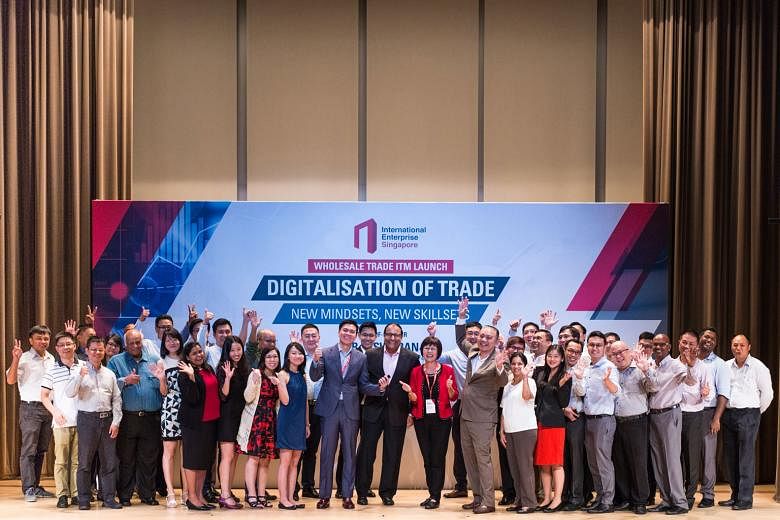Singapore stands to gain from the coming Asian consumer boom if it builds up digital platforms and invests in workers, Minister for Trade and Industry (Industry) S. Iswaran said yesterday.
He was launching the industry transformation map (ITM) for wholesale trade - goods traded between businesses - which made up 12 per cent of the nation's economic output last year.
The latest industry road map - one of 23 such plans across various sectors - sets a five-year growth target of 3.3 per cent to 3.5 per cent, in line with global trade projections from last year to 2020.
Growing regional demand for goods bodes well for trade and related services, Mr Iswaran told the audience at the NTUC Centre. "However, we must take proactive steps to further reinforce our status as a global trading hub."
He said that deep knowledge of South-east Asian markets "has to be one of our differentiating competitive advantages", even as the nature of cross-border trade evolves.
IE Singapore - which is merging with Spring Singapore to form the new Enterprise Singapore agency - is at the helm of the wholesale trade ITM. Chief executive Lee Ark Boon said in a statement: "'South-South' (hemispheric) trade is also growing much faster and Singapore is well positioned to play an important role."
Plans are afoot to plug supply and demand network gaps and help small and medium-sized enterprises connect with opportunities in emerging markets, through listings on digital marketplaces.
Tapping digitalisation to improve trade links is, in fact, a key strategy on the ITM's agenda.
For instance, a smart supply-chain deal was inked at the launch event as trade services provider Global eTrade Services Global and IBM Asia Pacific agreed to set up automated customs declaration at 18 checkpoints globally - including Singapore.
The system can even use cognitive capabilities and predictive analytics to help traders when problems crop up.
On its way too is the Asean Digital Trade Facilitation Platform - a one-stop shop for regional customs clearance, which is set to make its debut later this year.
IE is also working with other government bodies to identify financial technology solutions to capture value from e-commerce trade.
The industry retooling is needed because of "uncertainty and increasing digitalisation of global trade", Mr Lee said in his opening remarks at the launch.
The wholesale trade plan is also geared up to add 10,000 more jobs by 2020, on top of 325,000 positions now. NTUC assistant secretary-general Patrick Tay set out this goal in a blog post on Monday.
A skills framework for the sector is set to come into play by the second half of next year, with new agreements yesterday to create training programmes in international trade at the diploma, degree and mid-career levels. These follow existing schemes such as the Professional Conversion Programme for international trading executives.
Speaking to media at the launch, Mr Kenneth Chia, vice-president of the Seafood Industries Association of Singapore, said he was "pleasantly surprised" that IE managed to roll out an ITM for a sector that comprises diverse businesses.
As managing director of TheSeafoodCompany, which operates in Asian markets such as Malaysia, Indonesia, Vietnam and Myanmar, he especially welcomed the fresh tie-ups with educational institutions. The collaborations promise to produce workers with digital skills and who are prepared to venture beyond Singapore's borders.
"Our company is already in the midst of embarking on e-commerce projects, but... we couldn't find the people," he said.
Mr Frank Debets, managing partner at PwC Worldtrade Management Services, told The Straits Times: "For Singapore to continue to thrive as a physical and virtual trading hub, it needs to be seamlessly linked to other countries in Asia, and offer professionals with superior skill sets. The ITM provides a good starting point, but a hard battle will lie ahead to change the mindset and behaviour of wholesale traders here to improve their international competitiveness."


